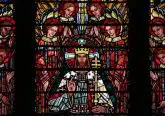Here’s the story of how the feast of Christ the King came about in Cincinnati
Denver Newsroom, Nov 20, 2021 / 13:47 pm
The Solemnity of Our Lord Jesus Christ, King of the Universe, celebrated this year on Nov. 21, also is referred to as the Feast of Christ the King, Christ the King Sunday, or Reign of Christ Sunday.
While the concept of Jesus Christ being King is as old as the Gospels, the feast is fairly recent in the Roman Catholic calendar.
The feast was introduced in the Western liturgical calendar in 1925 by Pope Pius XI, via the encyclical “Quas Primas.” Pope Pius XI was about to close the Jubilee year of 1925 in the context of the growing secularist nationalism that followed the fall of European kingdoms after World War I, and decided to establish the solemnity to point to a king “of whose kingdom there shall be no end.”
Surprisingly, the first parish in the world to be consecrated in honor of Our Lord Christ the King was established by Pope Pius XI not in Europe, but in Cincinnati, Ohio, in 1926.
“The 225 worshippers who attended Our Lord Christ the King’s first Mass on December 5, 1926, embodied the essence of what it means to be ‘church.’ With neither bricks nor mortar to call their own, this gathering of believers placed their faith in Providence and celebrated early liturgies in humble surroundings,” reads an account posted on the parish’s website. “There was no electricity for the first Eucharist, so the room was illuminated by headlights beamed from parked cars. Pastor Father Edward J. Quinn, a former World War I chaplain, used his Army Mass kit.”
The current church, built in the 50’s, was designed by famed church architect Edward J. Schulte in what is known as a “Brutalist” style.
Despite the fact that the first parish ever to be dedicated to Christ the King was in the United States, some American clergy originally had difficulty explaining the new solemnity in the context of American Protestant patriotism, which frowned upon kings and kingdoms as opposed to democracy as the most perfect form of government.
A key passage from Quas Primas provided Catholic preachers with a helpful synopsis. “This kingdom (of Christ) is spiritual and is concerned with spiritual things ….The gospels present this kingdom as one which men prepare to enter by penance, and cannot actually enter except by faith and by baptism, which, though an external rite, signifies and produces an interior regeneration. This kingdom is opposed to none other than to that of Satan and to the power of darkness. It demands of its subjects a spirit of detachment from riches and earthly things, and a spirit of gentleness. They must hunger and thirst after justice, and more than this, they must deny themselves and carry the cross.”
Pope Pius XI established the feast to be celebrated on the last Sunday of October, so that it would always take place before the celebration of the solemnity of All Saints. But in the new liturgical calendar of 1970, its Roman Rite observance was moved to the last Sunday of Ordinary Time. Therefore, the earliest date on which it can occur is Nov. 20 and the latest is Nov. 26.













